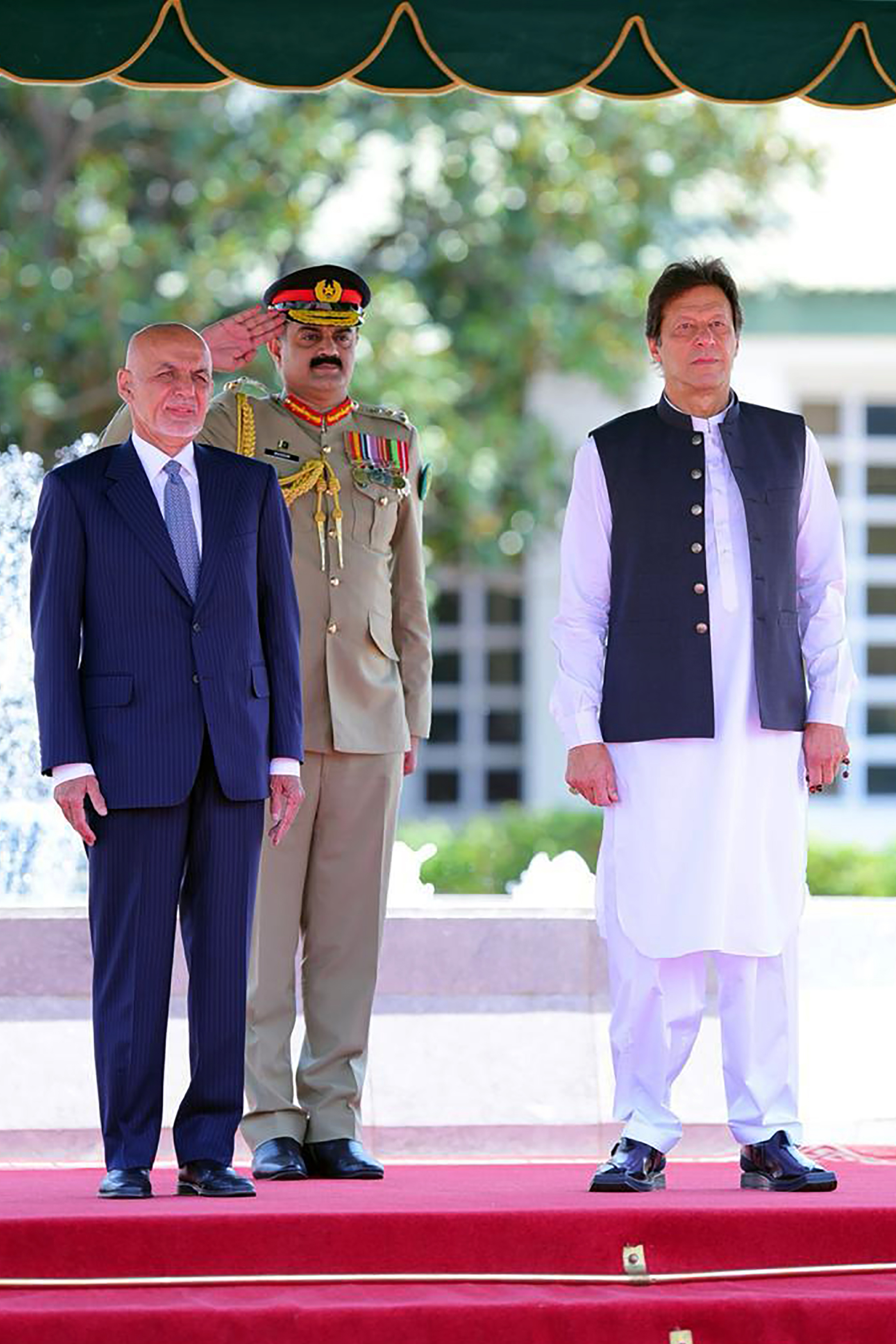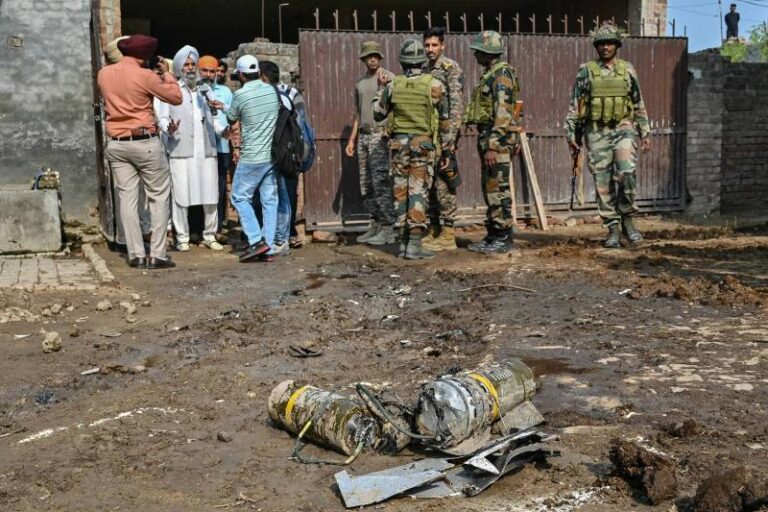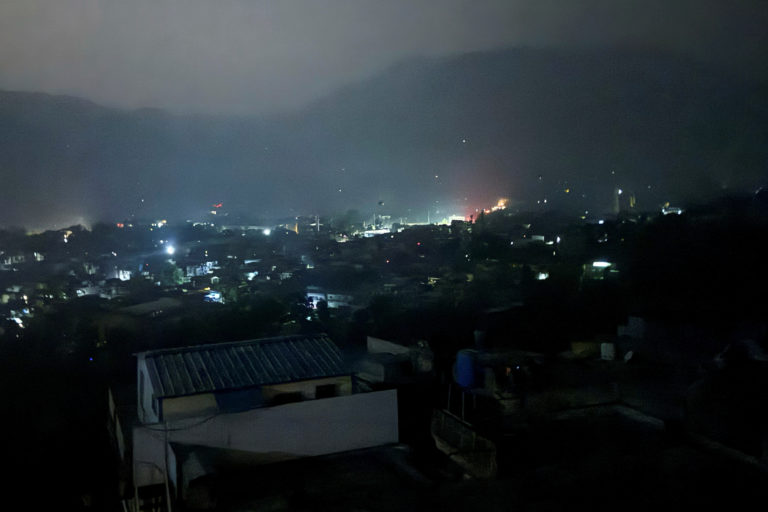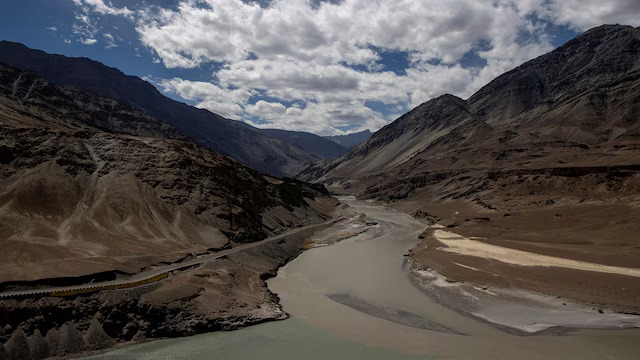
In this handout picture released by Pakistan Prime Minister Office on June 27, 2019, visiting Afghan President Ashraf Ghani (L) and Pakistani Prime Minister Imran Khan (R) review an honour guard during a welcome ceremony in Islamabad. (Photo by Handout / Pakistan Prime minister office / AFP) / XGTY / RESTRICTED TO EDITORIAL USE - MANDATORY CREDIT "AFP PHOTO /PAKISTAN PRIME MINISTER OFFICE " - NO MARKETING - NO ADVERTISING CAMPAIGNS - DISTRIBUTED AS A SERVICE TO CLIENTS
Rahimullah Yusufzai
While talking to the media after his recent meeting with President Donald Trump at the White House, Prime Minister Imran Khan cautiously said Pakistan would urge the Taliban to agree to direct peace talks with the Afghan government.
This was understandable considering the Taliban refusal to engage in a dialogue directly with the Afghan government as they consider it a puppet of the United States. This was the Taliban position when Hamid Karzai was the president of Afghanistan for 13 years and it has not changed in the five-year rule of President Ashraf Ghani in partnership with the country’s Chief Executive Dr Abdullah.
In fact, Pakistan’s Prime Minister during his maiden visit to the U.S. tried to play down expectations attached to Islamabad’s role in the complex Afghan peace process by pointing out that arranging the talks and making progress is not going to be easy.
Though Imran Khan, who has never held any public office before becoming the Prime Minister in July 2018, has no experience of interacting with the Afghan Taliban. He must have received briefing from the country’s military establishment about the difficulties being encountered in persuading the Taliban to give up their long-held position not to hold peace talks with the ‘powerless’ Afghan government. This apparently prompted the Prime Minister to keep expectations low with regard to Pakistan’s capacity to influence the Taliban decision-making process.
Following the Prime Minister’s visit to the U.S., his government is getting ready to formally invite a Taliban delegation to Pakistan for talks on this and other issues. A meeting with Imran Khan would be the highlight of the visit if it materializes. The Qatar-based Taliban Political Commission has expressed its willingness to send a delegation to Pakistan and also meet Prime Minister Imran Khan. This would be the first time that a Prime Minister of Pakistan would be meeting Afghan Taliban representatives publicly.
The fact remains that no elected government functionary has ever met members of the Taliban movement in public. This was because the military has been handling the Afghan issue and its input has been crucial in view of the security aspects of the uneasy Pak-Afghan relations. Pakistan’s elected governments too have been reluctant to become involved and updated on the Afghan issue, thereby leaving the issue in the hands of the military. Though the previous Prime Ministers had visited Afghanistan and received Afghan leaders in Pakistan, their input in policy formulation was not sufficiently visible. Imran Khan could prove an exception if he starts playing a bigger role in shaping Pakistan’s policy for seeking a politically negotiated end to the long drawn out Afghan conflict. His good terms with the army high command could enable him to play such a role. The fact that Army Chief, General Qamar Javed Bajwa accompanied the Prime Minister during the U.S. visit was further evidence of the close coordination between the civil and military leadership in context of important foreign policy issues such as relations with Washington.
An earlier attempt to arrange a meeting in Islamabad between Prime Minister Imran Khan and a Taliban delegation in February was abruptly cancelled by the latter by citing the travel restrictions placed on its members by the UN Security Council. Taliban had earlier confirmed the visit and said that their representatives would hold peace talks with Zalmay Khalilzad-led U.S. officials and also meet Pakistan’s Prime Minister in Islamabad. Fawad Chaudhry, the information minister in the PTI government at the time, had not only confirmed the visit of the Taliban delegation, but also termed it a game-changer for making Afghanistan peaceful and stable.
One of the reasons for postponement of Taliban delegation’s visit to Pakistan in February was the opposition by the Afghan government. It had criticized the proposed Taliban meeting with Prime Minister Imran Khan and termed it another example of Pakistan’s interference in Afghanistan’s affairs. Certain hawkish Taliban leaders were also reportedly opposed to the visit as this could have reinforced the perception that Taliban were controlled by Pakistan. This time though, the U.S. government is keen that Taliban publicly engage with Pakistan government, particularly the Prime Minister, and put pressure on the group to hold direct peace talks with the Afghan government. Since this could benefit the Afghan government, it too has dropped its opposition to Taliban delegation’s visit to Pakistan and its meeting with Premier Imran Khan.
Pak-Afghan relations have showed slight improvement following President Ashraf Ghani’s visit to Pakistan on June 27-28. He paid the visit after having refused to come to Pakistan earlier and realizing later that he needed Islamabad’s help just like the U.S. to engage with the Taliban. However, his move is belated as his five-year term as president has ended and the election campaign for the next presidential election being staged on September 28 has already started.
A few days before President Ghani’s visit to Pakistan, Islamabad organized an intra-Afghan meeting in Murree to play its role in the peace process. It was attended by 57 Afghan politicians, including many who had been critical of Pakistan in the past for backing the Afghan mujahideen during the 1980s and early 1990s and then the Taliban. Their presence showed they recognized Pakistan’s role in ensuring the success of the Afghan peace process. Still the Murree meeting was incomplete as the Afghan government and Taliban stayed away and some of the invitees such as former President Hamid Karzai did not come as he reportedly demanded high protocol.

It was obvious that the primary objective of President Trump to invite Prime Minister Imran Khan to visit the U.S. was to seek greater cooperation from Pakistan for ending the Afghan conflict so that the American troops could withdraw from Afghanistan. The U.S.-led Nato forces had failed to gain a military victory against the Taliban despite fighting for 18 long years and Washington had reluctantly accepted the Taliban demand for direct peace talks between the two sides in the absence of the Afghan government to bring to an end the longest war in the American history. Trump would be hoping that Pakistan could persuade and even arm-twist the Taliban leaders to show flexibility and agree to a permanent ceasefire and direct talks with the Afghan government. He appears willing to offer incentives to Pakistan to tempt it to enable the U.S. to have a face-saving solution in Afghanistan.
True to his reputation, Trump arrogantly claimed in Imran Khan’s presence at the White House that he could win the Afghan war in a week to 10 days but was not using this option as it could cause the death of 10 million people and wipe Afghanistan off the map of the world. This was the irresponsible rant of a desperate man and the option he was referring to was the use of nuclear weapons. Both the Afghan government and the Taliban criticized Trump’s remarks. The former sought a clarification and made it clear that Afghans alone would decide Afghanistan’s future while the latter pointed out that the U.S. was facing defeat just like previous invaders such as the Mongols, British and the Soviets. Such missteps by the Trump administration, which cannot be trusted after unilaterally pulling out of the nuclear agreement with Iran, could damage rather than moving forward the nascent Afghan peace process.
A subsequent White House statement that acknowledged Pakistan’s role in facilitating the peace process, but asked it to do more towards this end explained the demands and wishes of the U.S. Though the PTI government is celebrating Imran Khan’s visit as a success, it needs to temper the euphoria because the same Trump who is now praising the Prime Minister and Pakistan could turn hostile once more if the Taliban continue to be inflexible in the peace talks and the negotiations remain stalled.
Following Imran Khan’s visit, Taliban have one more time rejected the latest offer of peace talks by the Afghan government and rejected ceasefire. They have reiterated their demand that the U.S. needs to agree on a reasonable timeline for withdrawal of its forces from Afghanistan as the fight would continue until the last foreign soldier is pulled out as part of the peace agreement. Taliban are likely to stick to their demand in the eighth round of negotiations with the U.S. in Doha, Qatar in August for reaching an agreement based on the complete withdrawal of foreign forces. The Americans, on the other hand, would continue to insist on making progress on the three other core issues, including direct Afghan government-Taliban talks, permanent ceasefire and firm Taliban guarantees that Afghanistan’s soil would not be used in future for carrying out attacks against the U.S. and its allies. Though the Taliban-U.S. talks would continue, there is a stalemate and Pakistan is being asked to break it. It is a challenging task to say the least, but one worth trying as peace in Afghanistan would benefit not only the war-ravaged country but also Pakistan, the region and beyond.
Rahimullah Yusufzai is the Resident Editor at The News International, Peshawar and is a Correspondent of BBC World Service.







